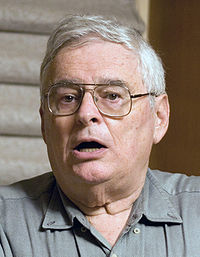Jerry Alan Fodor (born 1935) is an American philosopher and cognitive scientist. He holds the position of State of New Jersey Professor of Philosophy at Rutgers University and is the author of many works in the fields of philosophy of mind and cognitive science, in which he has laid the groundwork for the modularity of mind and the language of thought hypotheses, among other ideas. He is known for his provocative and sometimes polemical style of argumentation. Fodor argues that mental states, such as beliefs and desires, are relations between individuals and mental representations. He maintains that these representations can only be correctly explained in terms of a language of thought (LOT) in the mind. Furthermore, this language of thought itself is an actually existing thing that is codified in the brain and not just a useful explanatory tool. Fodor adheres to a species of functionalism, maintaining that thinking and other mental processes consist primarily of computations operating on the syntax of the representations that make up the language of thought. For Fodor, significant parts of the mind, such as perceptual and linguistic processes, are structured in terms of modules, or "organs", which he defines by their causal and functional roles. These modules are relatively independent of each other and of the "central processing" part of the mind, which has a more global and less "domain specific" character. Fodor suggests that the character of these modules permits the possibility of causal relations with external objects. This, in turn, makes it possible for mental states to have contents that are about things in the world. The central processing part, on the other hand, takes care of the logical relations between the various contents and inputs and outputs. Although Fodor originally rejected the idea that mental states must have a causal, externally determined aspect, he has in recent years devoted much of his writing and study to the philosophy of language because of this problem of the meaning and reference of mental contents. His contributions in this area include the so-called asymmetric causal theory of reference and his many arguments against semantic holism. Fodor strongly opposes reductive accounts of the mind. He argues that mental states are multiply realizable and that there is a hierarchy of explanatory levels in science such that the generalizations and laws of a higher-level theory of psychology or linguistics, for example, cannot be captured by the low-level explanations of the behavior of neurons and synapses. He has also emerged as a prominent critic of what he characterizes as the ill-grounded Darwinian and neo-Darwinian theory of natural selection.

Año de nacimiento
1935
Era
20th-century philosophy
Contemporary philosophy
Numero individualizado del archivo de la Biblioteca Nacional Alemana
119020122
Principal interés
Cognitive science
Cognitivism (ethics)
Functionalism (philosophy of mind)
Philosophy of language
Philosophy of mind
Rationalism



Comentar
0